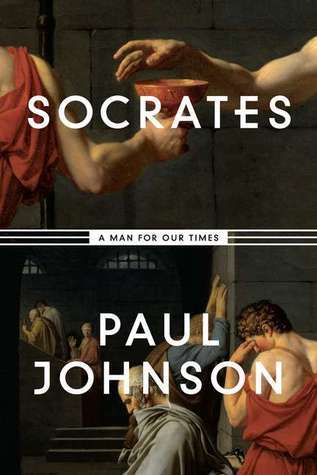What do you think?
Rate this book


224 pages, Hardcover
First published January 1, 2011
In his earlier writings Plato presented Socrates as a living, breathing, thinking person, a real man. But as Plato’s ideas took shape, demanding propagation, poor Socrates, whose actual death Plato had so lamented, was killed a second time, so that he became a mere wooden man, a ventriloquist’s doll, to voice not his own philosophy but Plato’s. Being an intellectual, Plato thought that to spread his ideas was far more important than to preserve Socrates as a historic, integrated human being. Using Socrates as an articulate doll was, he saw, the easiest way to bring about this philosophical dispersal. So the act of transforming a living, historical thinker into a mindless, speaking doll—the murder and quasi-diabolical possession of a famous brain—became in Plato’s eyes a positive virtue. That is the only charitable way of describing one of the most unscrupulous acts in intellectual history. Thus Plato, with no doubt the best intentions, created, like Frankenstein, an artificial monster-philosopher. It is particularly damaging to our understanding of Socrates in that the line of demarcation in Plato’s writings between the real Socrates and the monster is unclear. It has been argued about for centuries, without any universally accepted result, and anyone who writes on the subject must make up their own mind, as I have done in this account.
Socrates did not believe in the traditional pantheon of Greek religion, with gods specializing in particular services and leading tumultuous lives that were more mythology or fiction than serious religion. When Socrates was at his most devout, he always refers to ‚Äúgod‚Ä� or ‚Äúthe god,‚Ä� not ‚Äúthe gods.‚Ä� He was a monotheist.
The first book is a dialogue, Euthyphro, set before the trial, in which Socrates, suddenly becoming aware that he is shortly to be tried for impiety, realizes that he is not quite sure what impiety is, or piety for that matter, and seeks definitions. As usual, he is frustrated by his own methods of examination, and all he shows is the muddle and confusion that arise when humans, anxious to appease or gratify the gods by offering sacrifices, are unable to explain the practical value of these pious actions or why the gods should want them. Socrates was by instinct and reason a monotheist and could perfectly well have argued that a human soul does indeed please an omnipotent god by offering him a pure and virtuous life on earth, and that this is the only form of sacrifice (which involves dispensing with carnal pleasures and all forms of self-indulgence) that matters. But to argue on this line would merely give hostages to his legal opponents, so he does not take it.
so, he is not Socrates but a hybrid creature I callÃ˝ Platsoc.
In the first book of the Republic, Socrates, who is still himself at this point‚Ä�
***
In book 2 of the Republic (not a text where, in general, the real Socrates speaks, though I think he does in this particular passage)...
Aristophanes attacked them in Clouds before he got to know Socrates, and when he thought he was one of them, a mistake made by some others.Ã˝
His failure to examine slavery is the greatest lacuna in his otherwise comprehensive view of justice, indeed in his entire philosophy. Given his influence after his death, a sharp and reasoned condemnation of slavery would have had incalculable consequences, and perhaps have led to the abolition of this scourge of humanity many centuries ago. Of course it is possible that Socrates habitually questioned the justice of slavery in his conversations. I think it possible, indeed quite likely. If so, the implied rejection of slavery, like the explicit rejection of retaliation, would have played a part in the hostility to Socrates among some Athenians that led to his prosecution, conviction, and death.Ã˝
The success with which Socrates did this, worked out over numerous generations, gave clarity and power to the Greek world’s reception of Christianity and so made it more fruitful. That in itself was an enormous achievement, beside which the work of Plato and Aristotle, important though they were in the establishment of Christendom and so of the Western world that succeeded it, were peripheral contributions.

‚ÄúHe was the first to call philosophy down from the sky and establish her in the towns, and bring her into homes, and force her to investigate the life of men and women, ethical conduct, good and evil.‚Ä�